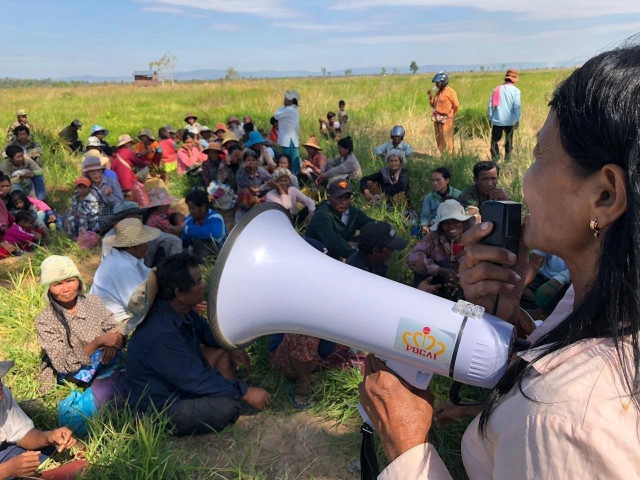The reasons behind what causes women to partake in land rights movements in Cambodia
Keat Botyphallyvong, Cambodia
GNMP Scholar, Chonnam National University, Gwangju

In Cambodia, women are rising up in response to land evictions as part of land rights movement to protect their land from development projects and their communities from forced evictions. Cambodian law is intended to attract more foreign investors through a program called Economic Land Concessions (ELCs). According to a Cambodian land law from 2001, “Land concessions responding to an economic purpose allow the beneficiaries to clear the land for industrial-agricultural exploitation of land in the territory of the Kingdom of Cambodia.” An ELC means that the government leases state-owned land of up to 10,000 hectares to private investors for a maximum of 99 years. The problem is that most, if not all, ELCs have been granted in areas where the government did not provide titles to the occupants even though the occupants generally had legal rights to titles. This policy of withholding titles in ELC areas and other areas with development potential have been a large part of the reason for forced evictions and violent protests all over the country for the last 20 years.
It may be seen that there are national and international mechanisms to support social movements in Cambodia’s society, but many land rights activists are still victimized and threatened by the local authorities when they advocate for their land rights. In recent years, the government hasn’t granted or revoked any ELCs, but the previous remaining land issues are continuously unresolved.
According to a LICADHO report entitled, “Good Wives: Women land campaigners and the impact of human rights activism,” women are often among those who suffers most. They are at the forefront of movements to protect their land rights which has led them to become effective community leaders and human rights advocates. The effects of the evictions have been mostly felt by women, and this has brought many women forward to actively participate in Cambodia’s overall land rights movement.
The reasons behind the involvement of women land rights activists in land rights movements
The Khmer tradition dictates that women should only stay at home. Studying at school and attending social acts and political events are also discouraged. Historically, women have been discriminated against so much so that women themselves think that the only thing they are good at are cooking and raising children.A research finding from the Cambodian Centre for Human Rights (CCHR) indicates that women are often motivated to take part to protect their land to ensure that their children have a safe home. They do this despite the fact that campaigning usually takes up much of their time that they would otherwise spend on earning income and doing care work. Women’s activism has the potential to have such a significant impact. They expressed that their main reason for taking part in the campaign was to provide their children with a good life by ensuring that they have a home now and in the future. A land rights activist who has been at the forefront of a decade-long struggle against land evictions in Koh Kong province in Cambodia shared in a film produced by the LICADHO website that, “It was suffering that encouraged me to begin activism.” She struggled to protest for her rights and continues her activism because she doesn’t want more people to experience the same problems she did and could stand up to defend themselves.
Another women’s land rights activist who is from the Boeung Kak community of Cambodia shared that her participation in the movement is to make women themselves realize that they should get involved in politics, excel in what they do, be confident and brave, and claim their rightful place in society, even if it takes being behind prison bars to prove this point. She adds that, “Our land struggle could have a positive impact in other places that have land issues too. We could serve as inspiration.” She was part of a group of women activists known as the "Boeung Kak 13," who were arrested on May 22, 2012, while protesting forced evictions from a poor community surrounding what used to be the Boeung Kak Lake in central Phnom Penh.
All in all, the reasons that many Cambodian women have involved themselves in the land rights movement is because the suffering they and their families faced can only be solved through demonstrations. They also want to be good role models for their community members and be able to break cultural norms that harm women and all of society.
Opportunities given to women land rights activists
The significant change when women became involved in community activism is the switching of roles in terms of decision making in their family. This change was something their husbands found very challenging. They explained that they had obeyed every decision their husbands made in the past, even though they sometimes disagreed with that. Now, when they share their views, they are not afraid to reject their husband’s ideas and they even make decisions independently. Women activists also reported experiencing benefits from being made the subject of leadership initiatives.Women land rights activists can also build alliances between other activists across different urban social movements as a first step towards developing a cross-sectoral women’s rights advocacy strategies. A story about a woman land rights campaigner in a report by LICADHO noted that being an activist, women have more opportunities to learn and gain knowledge from many organizations on law and advocacy. She added that this opened their eyes to understand a lot about social issues, being more confident and be able to help other communities by sharing what she has learned. Though gains are small, they are on the whole proud of what they have accomplished.


